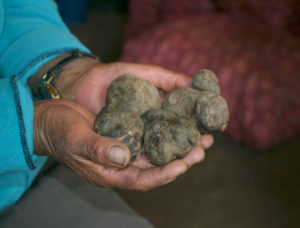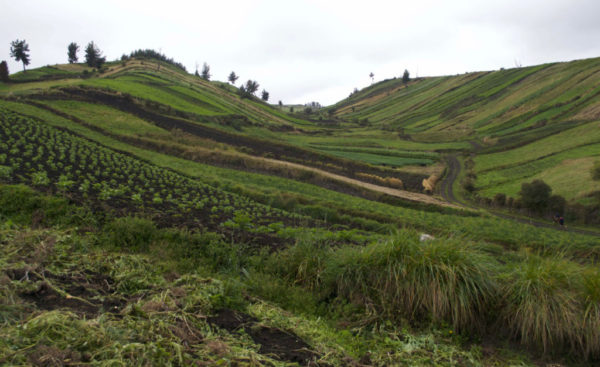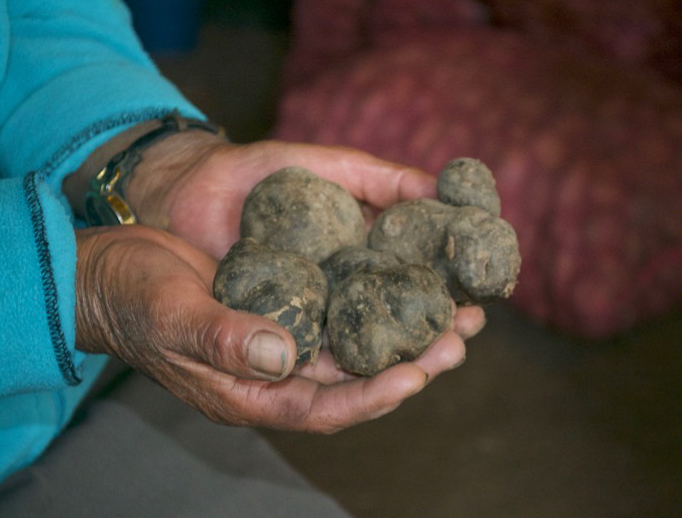The spread of disease in potato seed systems is a major risk to production and livelihoods. As root and tuber crops are propagated vegetatively, pathogens and pests can accumulate in planting material over successive cycles of propagation and lead to poor quality seed. Balancing the need to manage and control this, while also facilitating the efficient spread of improved varieties among farmers is a challenge. Addressing approaches for evaluating and mitigating the risk of disease in seed systems is an important research area for the CGIAR Research Program on Roots, Tubers and Bananas (RTB).

There are around 85,000 potato farmers in Ecuador, of which 75% are estimated to be small-scale producers. Photo courtesy Garrett Lab.
To address this need, we developed a new method of analysis to identify the most important individual stakeholders in a seed system – such as farms, seed multipliers and institutions – who should be a focus for disease detection and management efforts. We modeled and evaluated the spread of disease in farmer seed provisioning networks, or seed systems. We focused on a network of seed tuber transactions for members of a regional potato farmer consortium in Ecuador, called CONPAPA. An interactive interface allows users to see how a new disease is likely to spread through this network.
CONPAPA is a regionally successful farmer cooperative that helps members to buy disease-free planting material and provides training on how to effectively manage pests and diseases. The cooperative also sells potato that member farmers produce in a wide array of markets. In this case, we found that the CONPAPA seed and potato processing center, the main market in Ambato, central Ecuador, and some specific farmers were high risk, high return sites for disease detection and management. Among the CONPAPA members, the use of disease free seed tubers for planting was found to be 36% – much higher than the 2% previously reported for Ecuador.
We also examined the sources that farmers relied on for information about pest and disease management. Advice from staff at agrochemical stores was common, but was considered by farmers to be significantly less reliable than other sources. Farmer access to information, based on the number and quality of sources, was found to be similar for both women and men. However, women had a smaller amount of the market share for seed-tubers and ware potato.

Mitigating the spread of potato disease is an essential step towards helping boost Ecuador’s potato production, which is lower than neighbors, Colombia and Peru. Photo courtesy Garrett Lab.
The evaluation of seed system networks provided input for scenario analyses to evaluate potential improvements that could be made to the system. In this simple system, CONPAPA staff and facilities, the market in Ambato, small agro-chemical stores and certain farms were identified as priorities for disease management interventions based on the roles they played as sources of information or seed for farmers in the area. Suggested interventions to mitigate the spread of poor quality potato planting material include training on disease management, monitoring and improved variety dissemination.
This work was undertaken as part of an RTB project that seeks to reduce the impacts of “seed degeneration” in root and tuber crops, including potato, sweetpotato, yams, cassava and bananas. Models of disease spread, like the one we present, take into account the accumulation and spread of disease in planting materials, and can be applied to more systems to evaluate strategies for controlling risk. We show how the structure of seed networks influences the risk for seedborne disease, and can inform farmers, scientists and managers about where to invest effort to reduce risks to farmers.
The CONPAPA system is relatively small and simple, but the analyses we have developed here are also being applied to larger and more complicated systems, as part of the development of a general theory of seed system deployment in the CGIAR Research Program on Roots, Tubers and Bananas.
This blog was contributed by Chris Buddenhagen (University of Florida), Karen Garrett (Garrett Lab) and Jorge Andrade (International Potato Center), with Holly Holmes (RTB).
Buddenhagen, C.E., Hernandez Nopsa, J.F., Andersen, K.F., Andrade-Piedra, J., Forbes, G.A., Kromann, P., Thomas-Sharma, S., Useche, P., Garrett, K.A., 2017. Epidemic Network Analysis for Mitigation of Invasive Pathogens in Seed Systems: Potato in Ecuador. Phytopathology 107, 1209-1218. Access the open access article: doi:10.1094/PHYTO-03-17-0108-FI
